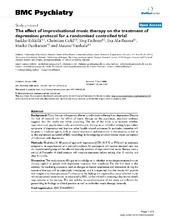| dc.description.abstract | Background: Music therapy is frequently offered to individuals suffering from depression. Despite the lack of research into the effects of music therapy on this population, anecdotal evidence suggests that the results are rather promising. The aim of this study is to examine whether improvisational, psychodynamically orientated music therapy in an individual setting helps reduce symptoms of depression and improve other health-related outcomes. In particular, attention will be given to mediator agents, such as musical expression and interaction in the sessions, as well as to the explanatory potential of EEG recordings in investigating emotion related music perception of individuals with depression. Methods: 85 adults (18–50 years of age) with depression (ICD-10: F 32 or F33) will be randomly assigned to an experimental or a control condition. All participants will receive standard care, but the experimental group will be offered biweekly sessions of improvisational music therapy over a period of 3 months. A blind assessor will measure outcomes before testing, after 3 months, and after 6 months. Discussion: This study aims to fill a gap in knowledge as to whether active (improvisational) music therapy applied to people with depression improves their condition. For the first time in this context, the mediating processes, such as changes in musical expression and interaction during the course of therapy, will be objectively investigated, and it is expected that the results will provide new insights into these processes. Furthermore, the findings are expected to reveal whether music related emotional experiences, as measured by EEG, can be utilized in assessing a depressive client's improvement in the therapy. The size and the comprehensiveness of the study are sufficient for generalizing its findings to clinical practice as well as to further music therapy research. | en_US |

